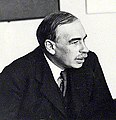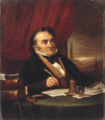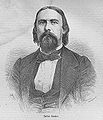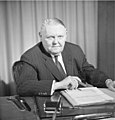The Liberalism portal
Liberalism is a political and moral philosophy based on the rights of the individual, liberty, consent of the governed, political equality, right to private property and equality before the law. Liberals espouse various and often mutually warring views depending on their understanding of these principles but generally support private property, market economies, individual rights (including civil rights and human rights), liberal democracy, secularism, rule of law, economic and political freedom, freedom of speech, freedom of the press, freedom of assembly, and freedom of religion, Liberalism is frequently cited as the dominant ideology of modern history.
Liberalism became a distinct movement in the Age of Enlightenment, gaining popularity among Western philosophers and economists. Liberalism sought to replace the norms of hereditary privilege, state religion, absolute monarchy, the divine right of kings and traditional conservatism with representative democracy, rule of law, and equality under the law. Liberals also ended mercantilist policies, royal monopolies, and other trade barriers, instead promoting free trade and marketization. Philosopher John Locke is often credited with founding liberalism as a distinct tradition based on the social contract, arguing that each man has a natural right to life, liberty and property, and governments must not violate these rights. While the British liberal tradition has emphasized expanding democracy, French liberalism has emphasized rejecting authoritarianism and is linked to nation-building. (Full article...)
Selected article -
The Radical Republicans (later also known as "Stalwarts") were a political faction within the Republican Party originating from the party's founding in 1854—some six years before the Civil War—until the Compromise of 1877, which effectively ended Reconstruction. They called themselves "Radicals" because of their goal of immediate, complete, and permanent eradication of slavery in the United States. The Radical faction also included, though, very strong currents of Nativism, anti-Catholicism, and in favor of the Prohibition of alcoholic beverages. These policy goals and the rhetoric in their favor often made it extremely difficult for the Republican Party as a whole to avoid alienating large numbers of American voters from Irish Catholic, German-, and other White ethnic backgrounds. In fact, even German-American Freethinkers and Forty-Eighters who, like Hermann Raster, otherwise sympathized with the Radical Republicans' aims, fought them tooth and nail over prohibition.
The Radicals were opposed during the war by the Moderate Republicans (led by President Abraham Lincoln), and by the Democratic Party. Radicals led efforts after the war to establish civil rights for former slaves and fully implement emancipation. After unsuccessful measures in 1866 resulted in violence against former slaves in the former rebel states, Radicals pushed the Fourteenth Amendment for statutory protections through Congress. They opposed allowing ex-Confederate politicians and military veterans to retake political power in the Southern U.S., and emphasized equality, civil rights and voting rights for the "freedmen", i.e., former slaves who had been freed during or after the Civil War by the Emancipation Proclamation and the Thirteenth Amendment. (Full article...)Selected biography -
John Bordley Rawls (/rɔːlz/; February 21, 1921 – November 24, 2002) was an American moral, legal and political philosopher in the modern liberal tradition. Rawls has been described as one of the most influential political philosophers of the 20th century.
In 1990, Will Kymlicka wrote in his introduction to the field that "it is generally accepted that the recent rebirth of normative political philosophy began with the publication of John Rawls's A Theory of Justice in 1971". Rawls's theory of "justice as fairness" recommends equal basic liberties, equality of opportunity, and facilitating the maximum benefit to the least advantaged members of society in any case where inequalities may occur. Rawls's argument for these principles of social justice uses a thought experiment called the "original position", in which people deliberately select what kind of society they would choose to live in if they did not know which social position they would personally occupy. In his later work Political Liberalism (1993), Rawls turned to the question of how political power could be made legitimate given reasonable disagreement about the nature of the good life. (Full article...)List of selected biographies
|
|---|
Selected quote
General images
Subcategories
Related portals
WikiProjects
Topics
Recognized content
Associated Wikimedia
The following Wikimedia Foundation sister projects provide more on this subject:
-
Commons
Free media repository -
Wikibooks
Free textbooks and manuals -
Wikidata
Free knowledge base -
Wikinews
Free-content news -
Wikiquote
Collection of quotations -
Wikisource
Free-content library -
Wikiversity
Free learning tools -
Wiktionary
Dictionary and thesaurus


























































